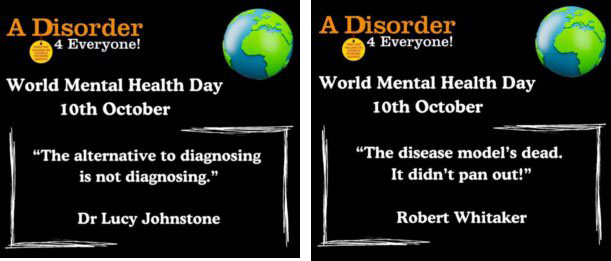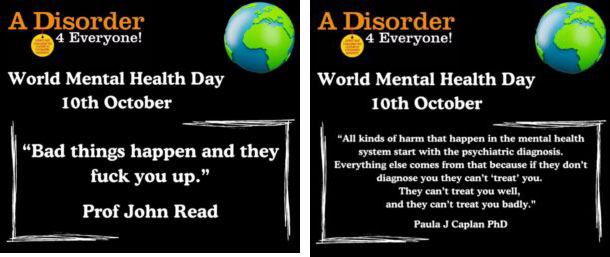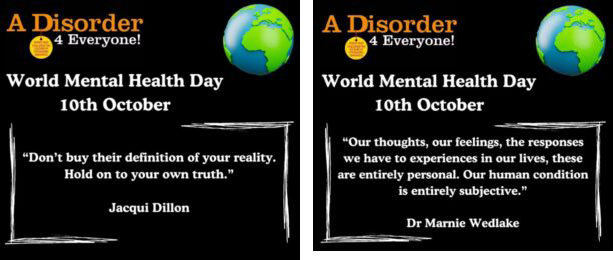Editor’s Note: This article originally appeared on our affiliate site, Mad in the UK. It was written by Jo Watson, psychotherapist and founder of Drop the Disorder! and A Disorder 4 Everyone (AD4E).
Eight years ago, on World Mental Health Day 2017, I wrote a piece for Mad in America called World Mental Health Day – Challenging the Messages – A Call to Action
Back then, I wrote about the sense of exhaustion and defeat that many of us felt in the lead up to World Mental Health Day. (A day that is essentially a gaslighting exercise for the mental health industry and a marketing opportunity for psychiatry and big pharma.)

We knew the wave of disease-model propaganda was coming, and we braced ourselves for it. But that year it felt especially raw. Our friend and ally Matt Stevenson had died only weeks before, after years of struggling with the weight of the psychiatric labels he had had imposed upon him.
https://www.madinamerica.com/2017/09/in-memoriam-matt-stevenson/
Matt’s death stripped away any ability to quietly tolerate the toxic messages pushed out every October.
That was the year I decided we would not just sit back and watch. With others in the Drop the Disorder Facebook group and the AD4E community, we set out to flood social media with alternative messages, challenging the lies at the heart of the biomedical story. We created and shared quotes, invited all voices in, and used the WMHD hashtags to disrupt the smooth surface of the official campaign. It wasn’t about thinking we could overpower the mainstream. It was about showing up, being visible, creating cracks in a narrative that harms people.

Almost a decade on, I hoped that by now things might look different.
They don’t. Not in the ways that matter. The same biomedical story still dominates. The same industries still profit. And the same tired messages are rolled out every October under the banner of “awareness.”
World Mental Health Day was created in 1992 by the World Federation for Mental Health. From the mid 1990s onwards, the day became a perfect platform for pharmaceutical companies to promote the idea of “mental disorders” as brain diseases that need to be medicated with psychiatric drugs. It is no surprise that Big Pharma has quietly sponsored WMHD campaigns, fuelling the chemical imbalance myth and shaping global mental health policy in ways that still influence everything today. (See references to reports below if you doubt this is true!)
So when we see governments, corporations and charities posting their colourful logos every October, let’s remember who benefits from that story. Because it definitely isn’t the people who are struggling.
But what has changed since that 2017 blog is us. The collective voice that refuses to collude has grown louder and more connected. Many more critical individuals, groups and organisations are demanding to be heard.
As for AD4E, since 2017 there have been three Drop the Disorder books, eighteen pre covid in person AD4E events across the UK, and countless conferences and gatherings where we’ve taken the same clear message. Distress is not a defect. Emotional pain is not a symptom of disease.
And now, here we are, fast approaching our sixth AD4E Festival on 7th November. A day that brings together people from around the world who see through the smokescreen and the gaslighting and are determined to build something different.
But to get to the solidarity of November the 7th we first have to get through the circus that is the 10th of October. The day when the mainstream story is amplified louder than ever. The day when the medical model gets dressed up as “care” and pushed out like a public health message.
No doubt once again we’ll be bombarded with glossy campaigns about the ever growing list of so called conditions and illnesses. With any luck the internet might implode under the weight of all the acronyms!
So what do we do?
I’ll be honest. I haven’t got quite the level of activist enthusiasm for the AD4E’s alternative meme campaign that I once had – but it still has a place. The good thing about short quotes is that people have usually read them before they’ve decided not to. And for those who stumble across an alternative message for the first time, something can shift. A single line can crack the story wide open.
So there is no harm in using the alternative AD4E campaign – The quotes have been updated over the years and you can find them here.
But also – memes are so last decade! We have SO much more critical online content out there than we did back then. Share the reels, the podcasts, the blogs, the films, the books, the writing, the conversations. Share it all. Fill the spaces that are usually dominated by big pharma and pseudo science with real stories, critical voices and unapologetic truth.
Let’s approach World Mental Health Day with the distaste and critical thinking it deserves. Refuse to swallow the slogans. Call them out for what they are. Together we can pull the curtain back on a system that pathologises pain for profit.
And then I hope to see you on the other side, at the AD4E Festival on Friday 7th November. A day to connect and continue to grow a movement, a community that might (one day) tip the balance and finally push World Mental Health Day and the dangerous story it sells into the history books where it belongs.
Love and solidarity
jo


References:
- Pharmaceutical support of a WMHD report: https://wfmh.global/img/what-we-do/publications/2017-wmhd-report-english.pdf
- The sponsorship of WMHD by pharmaceutical companies Eli Lilly and Company, Otsuka America Pharmaceutical, Inc.: https://pmc.ncbi.nlm.nih.gov/articles/PMC2939461/












It’s always the same issue / problem – until there is comprehensive access to healing alternatives the society / system will never change. & Anti / critical / alternative psychiatry plays just as much a part in this problem as the mainstream. At lest biomedical psychiatry offers some form of treatment, help & support.
Report comment
The concept of World Entropy Day is a moving idea! For the time shared, given, along with the seemingly unmet need for how and why this aspect of the whole econonomy seems to be lacking an awareness for how and why the balance operates. Even today, time was once again spent trying to find the appropriate legal intervention for systemic justice. Imagine how unsettling the lives lost, even if one, is lost due to the nightmarish experience of private or public hospitals. Who is responsible for the lack of continuous improvement? Both sides of the aisle can be approached, though who has the voice? To not have effective marketing and the costs “to protest” may need a higher call in ethical, transformative assemblage as ART/Science without launching a land grab! We also may need to know our history, what worked and doesn’t.
Report comment